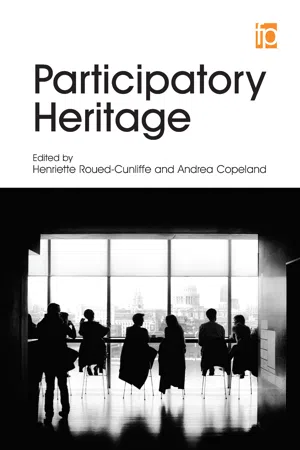
Participatory Heritage
- 240 pages
- English
- PDF
- Available on iOS & Android
Participatory Heritage
About this book
The internet as a platform for facilitating human organization without the need for organizations has, through social media, created new challenges for cultural heritage institutions. Challenges include but are not limited to: how to manage copyright, ownership, orphan works, open data access to heritage representations and artefacts, crowdsourcing, cultural heritage amateurs, information as a commodity or information as public domain, sustainable preservation, attitudes towards openness and much more.
Participatory Heritage uses a selection of international case studies to explore these issues and demonstrates that in order for personal and community-based documentation and artefacts to be preserved and included in social and collective histories, individuals and community groups need the technical and knowledge infrastructures of support that formal cultural institutions can provide. In other words, both groups need each other.
Divided into three core sections, this book explores:
- Participants in the preservation of cultural heritage; exploring heritage institutions and organizations, community archives and group
- Challenges; including discussion of giving voices to communities, social inequality, digital archives, data and online sharing
- Solutions; discussing open access and APIs, digital postcards, the case for collaboration, digital storytelling and co-designing heritage practice.
Readership: This book will be useful reading for individuals working in cultural institutions such as libraries, museums, archives and historical societies. It will also be of interest to students taking library, archive and cultural heritage courses.
Tools to learn more effectively

Saving Books

Keyword Search

Annotating Text

Listen to it instead
Information
Table of contents
- Title Page
- Contents
- PART 1 PARTICIPANTS
- PART 2 CHALLENGES
- Further reading
- Index
Frequently asked questions
- Essential is ideal for learners and professionals who enjoy exploring a wide range of subjects. Access the Essential Library with 800,000+ trusted titles and best-sellers across business, personal growth, and the humanities. Includes unlimited reading time and Standard Read Aloud voice.
- Complete: Perfect for advanced learners and researchers needing full, unrestricted access. Unlock 1.4M+ books across hundreds of subjects, including academic and specialized titles. The Complete Plan also includes advanced features like Premium Read Aloud and Research Assistant.
Please note we cannot support devices running on iOS 13 and Android 7 or earlier. Learn more about using the app